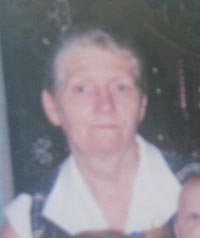









 Born in Neuburg (Novogradovka, 25 kms away from Odessa), Ovidiopol District,
Odessa Region, in 1940.
Born in Neuburg (Novogradovka, 25 kms away from Odessa), Ovidiopol District,
Odessa Region, in 1940.
The family was deported in the autumn of 1944. Nobody informed them about the plans to resettle them. They were given two hours only to pack up their belongings – 50 kgs maximum per person. They decided to take along one of their cows, garments, 5 feather beds and 4 pillows.
They went to the train station by horse. There they were taken away horse and cow. Then they had to board a train, which, soonafter, headed for Krasnoyarsk. The waggon disposed of just one tiny window and was stuffed with women, old people and children. Men were absent; some were at war, others had been killed for some reason or other.
The food ration consisted of bread and stewed fruit without sugar.
In all, the trip lasted for almost one year; they transited Poland and Germany. (AB - probably two events got mingled in the memory of little Ida, who was only four years old at that time: when the Germans begant to withraw, heading back for Germany, they took the Odessa Germans with them up to Poland; in Poland they parted company with the German troops and then happened to get into the Soviet zone, from where they were deported to Siberia. The adults probably kept silent about the fact that they followed the German troops during their fallback, and this might be the reason for why the picture remained in Ida Christianovna’s memory such as she now describes it).
On the way thieves made a lot of trouble, mostly after the train had stopped. Many a people starved. The corpses were buried somewhere near one of the next train stations, after they had been wrapped in some rags. They did not put up any crosses.
In Krasnoyarsk they lived in a two-storey building for about one month. They had to sleep right on the floor, were provided with food; they cooked their meals out of doors: they dug out a little pit, positioned brickstones around, sparked a fire and then put their cooking pot on the hot stones.
From Krasnoyarsk they were taken to Shirokiy Log by steamer “Lermontov”, where they stayed for two months. Afterwards they were sent to Kargino on hay carts. After having stayed there the whole winter, they were once again forced to board a steamer which transferred them to the island of Kartochniy.
I.Ch’s sisters were assigned to fell trees. In 1949 she finished the first school year.
Later they were taken back to Shirokiy Log, where they lived in barracks. They built themselves tables and wooden bedsteads, which they equipped with a kind of matrasses made of hay. 5 – 6 families were penned up in each barrack.
They swapped their belongings against comestibles (a feather bed was the equivalent for two bucketsful of potatoes). The parents had to get regisztered with the commandant’s office once a month. They were permitted to speak German.
At the age of 16 she began to work for a sleeper factory. When she was 18 she got married to a Russian. His parents were against the marriage, but inspite of their attitude, they then lived together.
In 1956 she was issued an identity card.
Interviewed by Svetlana Chernousova and Yevdokia Kurushina
(AB – comments by Aleksei Babiy, Krasnoyarsk “Memorial”)
Fifth expedition of history and human rights, Novokargino, 2008